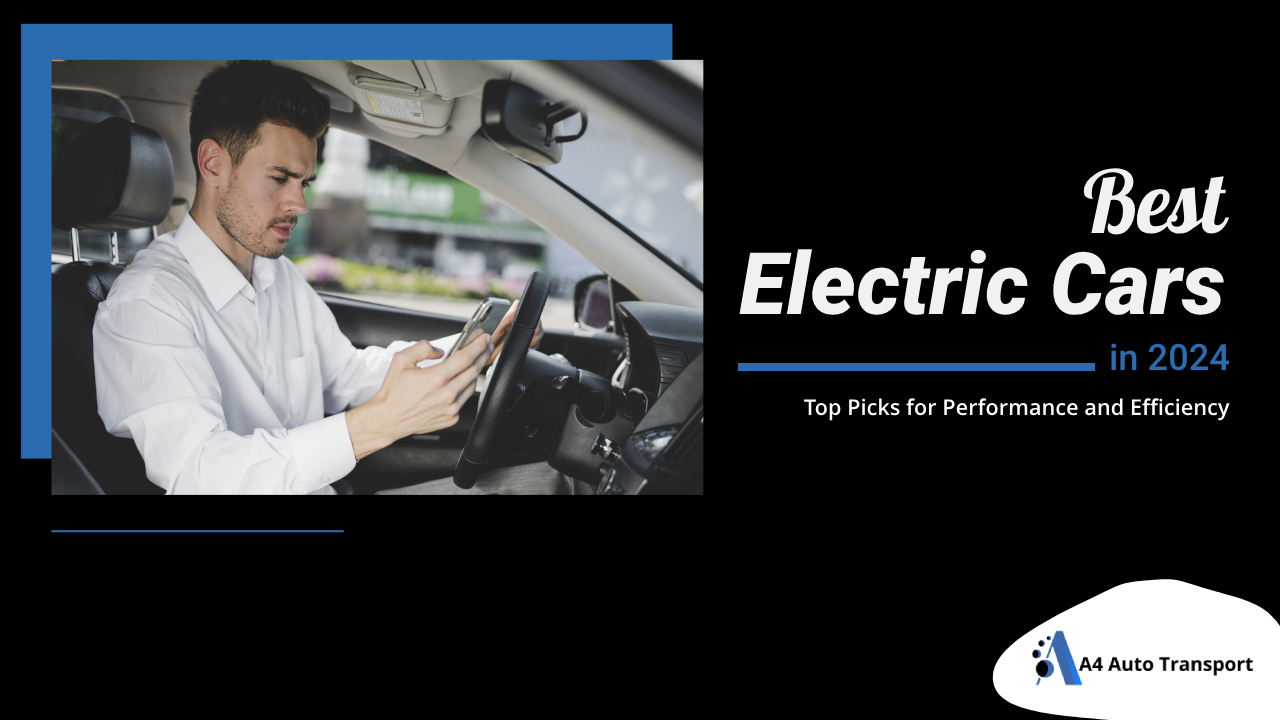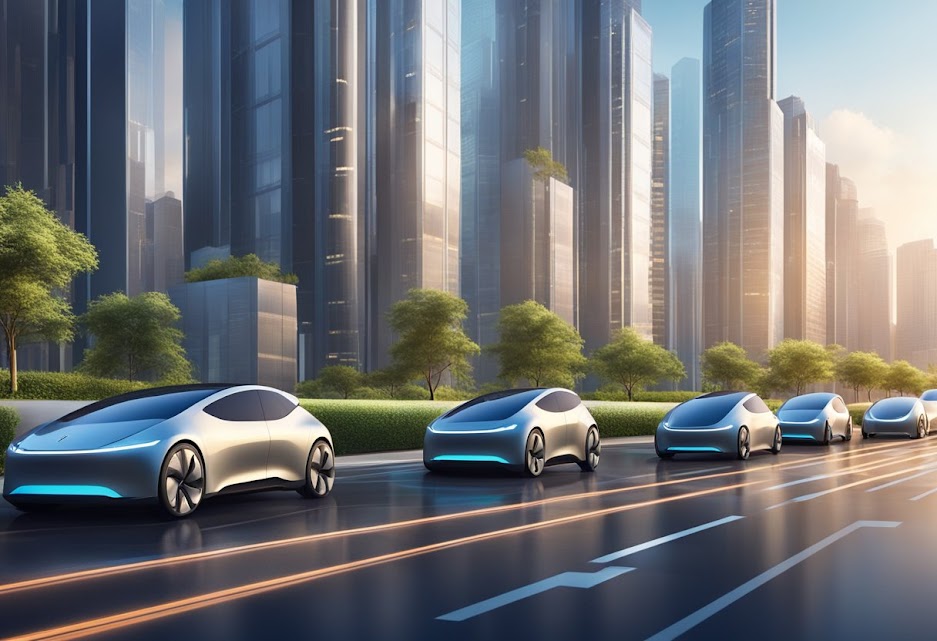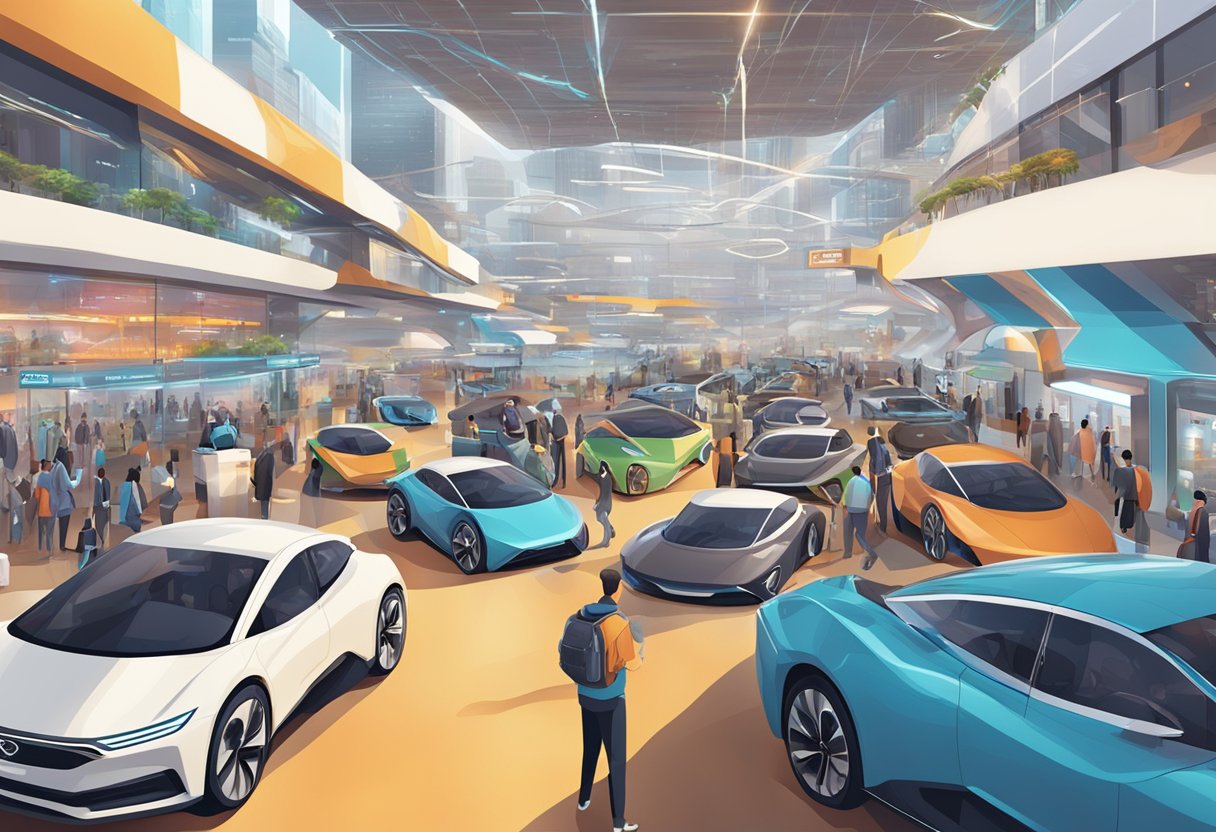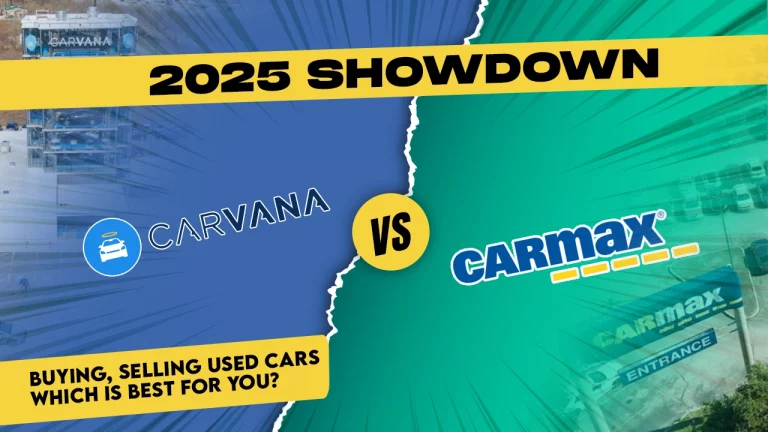Best Electric Cars in 2024: Top Picks for Performance and Efficiency

Electric cars have taken the automotive industry by storm, and with each passing year, we see a new wave of cutting-edge models that push the boundaries of what is possible. As we look ahead to 2024, we can expect to see a host of exciting new electric vehicles (EVs) hitting the market, each with its unique features and capabilities. From sleek sports cars to spacious family vehicles, there is an EV out there for everyone.

In this article, we will take an in-depth look at the top electric cars of 2024. We will explore the latest advancements in electric vehicle technology and compare electric cars to hybrid and gasoline-powered vehicles.
We will also provide a comprehensive guide to help consumers choose the right electric car for their needs, including information on government incentives and policies, market trends and predictions, charging solutions and technologies, and maintenance and ownership.
Whether you are a seasoned EV driver or are considering making the switch to electric, this article has everything you need to know about the best electric cars of 2024.
Key Takeaways
- The electric car market is rapidly expanding, with a range of exciting new models set to hit the market in 2024.
- Electric cars offer a range of benefits over hybrid and gasoline-powered vehicles, including lower emissions, improved fuel efficiency, and reduced maintenance costs.
- Consumers looking to purchase an electric car in 2024 should consider factors such as government incentives, charging solutions, and maintenance and ownership costs to ensure they choose the right vehicle for their needs.
Top Electric Cars of 2024
As electric cars become increasingly popular, more and more automakers are entering the market. In 2024, we can expect to see some exciting new electric cars that will offer impressive range, performance, and features. Here are some of the top electric cars of 2024 that we are most excited about:
1. Kia EV6
The Kia EV6 is a stylish and sporty electric crossover that offers impressive performance and range. With 167 horsepower, it can go from 0-60 in just 5.1 seconds, and it has a range of up to 232 miles on a single charge. It also features a modern and high-tech interior with a large touchscreen display and advanced safety features. Overall, the Kia EV6 is a great choice for anyone looking for a fun and practical electric vehicle.
2. Hyundai Ioniq 6
The Hyundai Ioniq 6 is a sleek and stylish electric sedan that offers impressive range and performance. With a range of up to 361 miles on a single charge, it is one of the most practical electric cars on the market. It also features a powerful electric motor that delivers up to 320 horsepower, making it a joy to drive. Inside, it has a spacious and modern interior with a large touchscreen display and advanced safety features.
3. Audi Q6 e-tron
The Audi Q6 e-tron is a luxurious and high-tech electric SUV that offers impressive performance and features. With up to 402 horsepower, it can go from 0-60 in just 4.5 seconds, and it has a range of up to 300 miles on a single charge. It also features a high-tech interior with advanced infotainment and safety features, as well as a sleek and modern exterior design.
4. Tesla Model Y
The Tesla Model Y is a popular electric crossover that offers impressive range, performance, and features. With a range of up to 326 miles on a single charge, it is one of the most practical electric cars on the market. It also features a powerful electric motor that delivers up to 456 horsepower, making it a joy to drive. Inside, it has a spacious and modern interior with a large touchscreen display and advanced safety features.
In conclusion, the electric car market is growing rapidly, and many exciting new models are coming in 2024. Whether you are looking for a practical and efficient electric car or a high-performance luxury vehicle, there is sure to be an electric car that meets your needs.
Advancements in Electric Vehicle Technology
As electric cars become increasingly popular, automakers are investing heavily in research and development to improve their technology. Here are some of the advancements we can expect to see in electric vehicles in 2024.
Battery Innovations
One of the biggest challenges facing electric cars is the limited range of their batteries. However, advancements in battery technology are making it possible for electric cars to travel longer distances on a single charge. For example, Tesla is developing a new battery technology called the 4680 cell, which promises to be more energy-dense and longer-lasting than current batteries. Other automakers are also working on improving their battery technology to provide longer ranges.
Efficiency Improvements
Another area where electric cars are seeing improvements is in their efficiency. Automakers are working on making their electric cars more aerodynamic, which can help reduce drag and improve their range. They are also developing more efficient motors and power electronics to make electric cars more energy-efficient. Additionally, some automakers are experimenting with solar panels on the roofs of their electric cars to help charge the battery and extend their range.
Autonomous Driving Features
Finally, many automakers are investing in autonomous driving technology, which can help make electric cars safer and more convenient to use. Some electric cars already have semi-autonomous features, such as adaptive cruise control and lane departure warning systems. However, in 2024, we can expect to see more advanced autonomous driving features, such as self-parking and highway autopilot, become more common in electric cars.
In conclusion, the advancements in electric vehicle technology are making electric cars more practical and convenient for everyday use. With longer ranges, greater efficiency, and advanced autonomous driving features, electric cars are becoming a more viable alternative to traditional gasoline-powered cars.
Comparative Analysis: Electric vs. Hybrid vs. Gasoline
When it comes to choosing a car, there are many factors to consider, including performance, environmental impact, and long-term cost savings. In this section, we’ll compare electric, hybrid, and gasoline cars based on these criteria.
Performance Metrics
Electric and hybrid cars have become increasingly popular due to their superior fuel efficiency and lower emissions. Electric cars are powered by a battery that stores energy from an electrical outlet, while hybrid cars use both an electric motor and a gasoline engine. Gasoline cars, on the other hand, rely solely on gasoline to power their engines.
In terms of acceleration, electric cars are often faster than gasoline cars due to their instant torque. Hybrid cars can also offer good acceleration, but they may not be as quick as electric cars. Gasoline cars typically have good acceleration, but they may not be as efficient as electric or hybrid cars.
When it comes to range, gasoline cars have the advantage, as they can travel much farther on a single tank of gas than electric or hybrid cars can on a single charge. However, electric cars are improving in this area, with some models offering ranges of over 300 miles on a single charge.
Environmental Impact
Electric and hybrid cars are often touted as being better for the environment than gasoline cars, as they produce fewer emissions. Electric cars produce no emissions at all, while hybrid cars produce less emissions than gasoline cars due to their electric motors.
However, it’s worth noting that the environmental impact of electric and hybrid cars depends on how the electricity used to power them is generated. If the electricity comes from renewable sources like wind or solar power, then electric and hybrid cars are much better for the environment than gasoline cars. However, if the electricity comes from coal-fired power plants, then the environmental benefits of electric and hybrid cars are reduced.
Long-Term Cost Savings
While electric and hybrid cars can be more expensive to purchase than gasoline cars, they can offer significant long-term cost savings. Electric cars are much cheaper to operate than gasoline cars, as they require no gasoline and have fewer moving parts that need maintenance. Hybrid cars are also cheaper to operate than gasoline cars, but they still require gasoline and have more moving parts than electric cars.
In terms of resale value, electric and hybrid cars tend to hold their value better than gasoline cars, as they are in high demand due to their fuel efficiency and low emissions.
Overall, electric and hybrid cars offer many advantages over gasoline cars, including better performance, lower emissions, and long-term cost savings. However, gasoline cars still have an advantage when it comes to range, and their environmental impact depends on how the gasoline is produced.
Consumer Guide: Choosing the Right Electric Car
As electric cars become more popular, choosing the right one can be a daunting task. There are several factors to consider, including vehicle specifications, brand reputation, and charging infrastructure. In this section, we will guide you through the process of choosing the right electric car for your needs.
Understanding Vehicle Specifications
When choosing an electric car, it is important to understand the vehicle specifications. This includes the range, battery capacity, and charging time.
The range is the distance the car can travel on a single charge. Battery capacity refers to the amount of energy the battery can store. Charging time is the time it takes to fully charge the battery.
It is important to choose a car with a range that meets your needs. If you have a long commute or frequently take road trips, you may want to choose a car with a longer range. Battery capacity is also important, as it determines how long the car can go between charges. Charging time is also a factor, as it determines how long you will need to wait to charge the car.
Evaluating Brand Reputation
When choosing an electric car, it is also important to consider the brand reputation. You want to choose a brand that has a good reputation for quality and reliability. You may also want to consider the brand’s commitment to electric vehicles and sustainability.
Researching the brand’s history can help you determine if it is a good fit for your needs. You can also read reviews from other electric car owners to get an idea of their experiences with the brand.
Assessing Charging Infrastructure
Another important factor to consider when choosing an electric car is the charging infrastructure. You want to choose a car that is compatible with the charging stations in your area. You may also want to consider the availability of charging stations on long road trips.
Researching the charging infrastructure in your area can help you determine if an electric car is a good fit for your needs. You can also look for charging stations along your regular routes to determine if they are accessible.
Overall, choosing the right electric car requires careful consideration of several factors. By understanding vehicle specifications, evaluating brand reputation, and assessing charging infrastructure, you can make an informed decision that meets your needs.
Government Incentives and Policies
Tax Credits and Subsidies
As of January 1, 2024, the US government offers tax credits worth up to $7,500 for the purchase of qualifying electric vehicles (EVs) and plug-in hybrids. The Inflation Reduction Act extends the current incentives of up to $7,500 in tax credits for select electric cars, plug-in hybrids, and hydrogen-powered vehicles that meet government regulations. This means that consumers can claim the tax credit at the dealership, rather than waiting to file their tax returns.
To qualify for the full tax credit, the EV must have a battery capacity of at least 16 kilowatt-hours (kWh) and must be a new purchase, not a used one. The tax credit amount decreases as the manufacturer sells more EVs, with the credit phasing out completely once a manufacturer sells 200,000 qualifying vehicles.
Additionally, some states offer additional incentives, such as rebates, tax credits, or reduced registration fees, to encourage the adoption of EVs. For example, California offers a rebate of up to $2,500 for the purchase or lease of a new EV, while Colorado offers a tax credit of up to $5,000.
Regulations and Standards
To reduce greenhouse gas emissions and promote the adoption of EVs, the US government has set emissions standards for automakers. The Corporate Average Fuel Economy (CAFE) standards require automakers to meet a minimum fuel economy target for their fleet of vehicles, including EVs. The standards are set to increase each year, to reach an average fuel economy of 54.5 miles per gallon by 2025.
In addition, the Environmental Protection Agency (EPA) sets emissions standards for vehicles, including EVs. The EPA’s Tier 3 standards, which took effect in 2017, set stricter limits on emissions of nitrogen oxides (NOx), particulate matter (PM), and other pollutants from vehicles.
Overall, these government incentives and regulations encourage the adoption of EVs and help to reduce the environmental impact of transportation.
Market Trends and Predictions

Sales Forecasts
We predict that the electric vehicle market will continue to grow in 2024. According to
Euromonitor’s Mobility forecasts, 25% of all new passenger car registrations are forecast to be electric in 2024, exceeding 17 million units in sales globally. This is a significant increase from the 2.5 million electric vehicles sold in 2020.
Furthermore, the demand for electric cars is expected to increase due to the growing concern for the environment and the need for sustainable transportation. Governments around the world are also offering incentives and subsidies to encourage people to switch to electric vehicles, which will further drive demand.
Emerging Manufacturers
In addition to established automakers, we expect to see a rise in emerging manufacturers in the electric car market in 2024. These manufacturers will bring innovation and new technology to the market, providing consumers with more options to choose from.
One such manufacturer is Polestar, Volvo’s upscale all-electric brand. Their entry-level product, the Polestar 2, is receiving a bump in power and range in 2024. Another emerging manufacturer is Lucid Motors, a luxury electric vehicle company that is set to release the Lucid Air in 2024. The Lucid Air boasts a range of over 500 miles per charge, making it a strong contender in the electric car market.
Overall, we predict that the electric car market will continue to grow in 2024, with more sales and emerging manufacturers entering the market. This growth will provide consumers with more options and incentives to switch to sustainable transportation.
Charging Solutions and Technologies
As electric cars become more popular, charging solutions and technologies are becoming increasingly important. In 2024, we expect to see significant improvements in both home charging stations and public charging networks.
Home Charging Stations
Home charging stations are a convenient and cost-effective way to keep your electric car charged. In 2024, we expect to see continued innovation in this area, with more affordable and user-friendly options available.
One of the most exciting developments in home charging stations is the emergence of smart charging technology. With smart charging, you can set your car to charge during off-peak hours when electricity rates are lower. This can save you money and help reduce strain on the power grid.
Public Charging Networks
Public charging networks are essential for long-distance travel and for those who don’t have access to a home charging station. In 2024, we expect to see continued expansion of public charging networks, with more charging stations available in more locations.
One of the most significant developments in public charging networks is the emergence of ultra-fast charging technology. With ultra-fast charging, you can charge your car in just a few minutes, making long-distance travel much more convenient. However, it’s important to note that not all electric cars are compatible with ultra-fast charging, so be sure to check your car’s specifications before using this technology.
Overall, we expect to see significant improvements in charging solutions and technologies in 2024. Whether you’re charging at home or on the go, there will be more options available than ever before.
Maintenance and Ownership
Service and Repair
When it comes to electric cars, service and repair costs are generally lower than their gas counterparts. This is because electric cars have fewer moving parts and require less maintenance. However, it is important to note that electric cars still require regular maintenance, such as tire rotations, brake inspections, and battery checks.
One of the main components of an electric car is the battery, which can be expensive to replace. However, with proper care and maintenance, an electric car battery can last up to 10 years. It is important to follow the manufacturer’s recommended maintenance schedule and to have the battery checked regularly to ensure its longevity.
Depreciation and Resale Value
Electric cars have historically had a higher depreciation rate than gas cars, but this trend is changing as more people switch to electric cars. According to Edmunds, some electric cars, such as the Tesla Model 3, have a resale value that is higher than their gas counterparts.
One reason for this is the increasing demand for electric cars and the limited supply. As more people switch to electric, the demand for gas cars decreases, which can lead to a decrease in their resale value. Additionally, electric cars often have longer warranties and lower maintenance costs, which can make them more appealing to buyers.
In conclusion, electric cars have lower service and repair costs and can have a higher resale value than gas cars. However, it is important to follow the manufacturer’s recommended maintenance schedule and to have the battery checked regularly to ensure its longevity.
FAQs
What are the top-rated electric vehicles available in 2024?
The best electric cars available in 2024 include the Hyundai Ioniq 6, BMW i7, Lucid Air, and Kia EV6. These cars have received high ratings from experts and consumers alike due to their impressive range, performance, and features.
Which new electric vehicle startups are expected to be market leaders in 2024?
Several new electric vehicle startups are expected to be market leaders in 2024, including Rivian, Lucid Motors, and Fisker Inc. These companies have received significant investments and have made headlines with their innovative designs and technology.
How does the latest Chevy Bolt compare to other electric vehicles in its class?
The latest Chevy Bolt is a compact electric vehicle that offers a range of up to 259 miles per charge, making it one of the most efficient cars in its class. While it may not have the same luxury features as some of its competitors, it is an affordable and reliable option for those looking for a practical electric car.
What electric car models offer the longest range per charge as of 2024?
As of 2024, the electric car models that offer the longest range per charge include the Tesla Model S Plaid, Lucid Air Dream Edition, and the Rivian R1T. These cars have a range of over 500 miles per charge, making them ideal for long road trips and daily commutes.
Can you list the most cost-effective electric cars that debuted in 2024?
Some of the most cost-effective electric cars that debuted in 2024 include the Kia EV6, Chevrolet Bolt, and the Volkswagen ID.4. These cars offer a balance between affordability and features, making them great options for those looking to switch to electric vehicles.
What incentives are available for electric vehicle purchases in 2024?
There are several incentives available for electric vehicle purchases in 2024, including federal tax credits, state rebates, and utility company incentives. These incentives can help offset the cost of purchasing an electric car and make it more accessible to a wider range of consumers.
a4AutoTransport is a group of auto transport researchers and experts that comes in handy for anyone who wants to move their car/vehicle without putting extra miles on the odometer. At a4AutoTransport, We researched over a hundred car shipping companies, interviewed real customers and industry leaders, and collected nearly 500 quotes to find the nation’s best auto transport companies. With our combined 5 years of industry experience and research, we’ll help you find the right car shipper for your budget.






